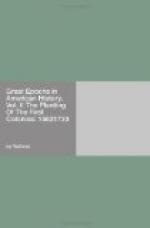Affairs were in this condition when the King’s Governor arrived. About a hundred alleged witches were now in jail, awaiting trial. Their case was one of the first matters to which his attention was called. Without authority for so doing,—for by the charter which he represented, the establishment of judicial courts was a function of the General Court,—he proceeded to institute a special commission of Oyer and Terminer, consisting of seven magistrates, first of whom was the hard, obstinate, narrow-minded Stoughton. The commissioners applied themselves to their office without delay. Their first act was to try Bridget Bishop, against whom an accusation twenty years old and retracted by its author on his death-bed, had been revived. The court sentenced her to die by hanging, and she was accordingly hanged at the end of eight days. Cotton Mather, in his account of the proceedings, relates that as she passed along the street under guard, Bishop “had given a look toward the great and spacious meeting-house of Salem, and immediately a daemon, invisibly entering the house, tore down a part of it.” It may be guessed that a plank or a partition had given way under the pressure of the crowd of lookers-on collected for so extraordinary a spectacle.
At the end of another four weeks the court sat again and sentenced five women, two of Salem, and one each of Amesbury, Ipswich, and Topsfield, all of whom were executed, protesting their innocence. In respect to one of them, Rebecca Nourse, a matron eminent for piety and goodness, a verdict of acquittal was first rendered. But Stoughton sent the jury out again, reminding them that in her examination, in reference to certain witnesses against her who had confest their own guilt, she had used the expression, “they came among us.” Nourse was deaf, and did not catch what had been going on. When it was afterward repeated to her she said that by the coming among us she meant that they had been in prison together. But the jury adopted the court’s interpretation of the word as signifying an acknowledgment that they had met at a witch orgy. The Governor was disposed to grant her a pardon. But Parris, who had an ancient grudge against her, interfered and prevailed. On the last communion day before her execution she was taken into church, and formally excommunicated by Noyes, her minister....
In the course of the next month, in which the Governor left Boston for a short tour of inspection in the Eastern country, fifteen persons—six women in one day, and on another eight women and one man—were tried, convicted, and sentenced. Eight of them were hanged. The brave Giles Corey, eighty years of age, being arraigned, refused to plead. He said that the whole thing was an imposture, and that it was of no use to put himself on his trial, for every trial had ended in a conviction,—which was the fact. It is shocking to relate that, suffering the penalty of the English common law for a contumacious refusal to answer,—the peine forte et dure,—he was prest to death with heavy weights laid on his body. By not pleading he intended to protect the inheritance of his children, which, as he had been informed, would by a conviction of felony have been forfeit to the crown.




